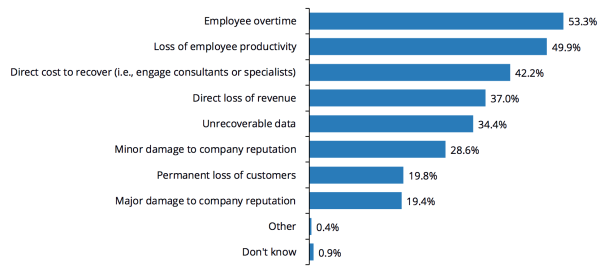25 September 2018

The consequences of tech-related business disruptions vary in severity. SOURCE: THE STATE OF IT RESILIENCE, IDC
More than 90 per cent of senior level IT and business managers do not consider their organisations to be IT resilient, according to a white paper published by IDC in August.
The State of IT Resilience highlights the gap between companies’ aspirations to modernise and a lack of maturity regarding the resilience of their IT systems.
IDC Research surveyed 500 senior level IT and business managers about the challenges to achieve IT resiliency and its importance to digital transformation.
Respondents were from North America, Europe, and Asia, and from companies that had 1,000 to 10,000 employees.
They represented more than 10 unique industries, the top three of which were IT, financial services, and manufacturing.
It found that while the majority of businesses have a cloud, digital transformation or modernisation project already planned for the next two years, these same businesses rate themselves as immature on resilience objectives.
IDC says this gap highlights the current demands on IT teams who are being tasked with cloud and modernisation projects even as they struggle to keep pace with basic protection and recovery.
Nearly half (49 per cent) revealed that they have suffered an unrecoverable data event in the last three years.
Additionally, 77 per cent of those surveyed said they have suffered organisational impact from a tech-related business disruption in the past two years.
Of these, 79 per cent lost money either directly or through paying for additional recovery expertise, and a fifth permanently lost customers as a result of the disruption.
While 90 per cent of organisations believe data protection is important or critical for digital and/or IT transformation projects, the technological provisions are not in place to provide this level of data protection assurance.
Only seven per cent of respondents rated themselves as mature for business resilience.
IDC says ensuring that the entire IT infrastructure is resilient will be critical for business success and for completion of transformation, modernisation and cloud projects.
It warns that the risks are only going to become greater as disasters encompass broader categories of disruption, including malicious attacks.
The researchers say IT resilience needs to be a key strategic priority for any forward-thinking organisation, and that data protection needs to be a top priority.
More than 55 per cent of businesses expect the complexity of data protection to increase, and having multiple tools only enhances this complexity.
To meet this growing complexity, 85 per cent plan to hire and/or train more staff, and 94 per cent expect to spend more on IT resilience in the next 24 months.
Cloud was also highlighted as an essential part of IT resilience, as cloud-based data protection was the highest-rated IT initiative over the next 12 months.
IDC research director Phil Goodwin says: “Across the industry, we are seeing the approach to data protection evolving from individual backup, disaster recovery and mobility solutions into a more unified approach, to ensure data is protected comprehensively, anywhere, at all times.
“In the multi-cloud era, this combined approach will be integral to raising the maturity of resilience technology in businesses, and protecting organisations from the many significant risks of disruption.”
The State of IT Resilience was sponsored by disaster recovery and business continuity software specialist Zerto.
Avi Raichel, the company’s CIO, says it is worrying that many organisations do not have the right technology to protect themselves in the evolving current digital era.
“From my experience, simply buying another product to fix the issue only creates more problems and still leaves the business vulnerable to technology disruptions and malicious attacks in the near future.
“As a CIO myself, I advise IT teams to focus on simplifying their technology portfolio, searching out converged solutions that can manage their entire IT resilience operation – cloud mobility, backup and disaster recovery – from a single viewpoint.”










